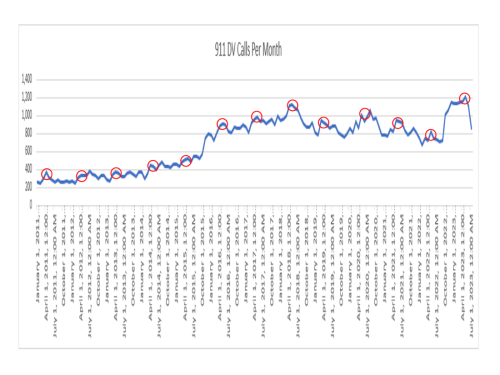Are Climate Crises Increasing Domestic Violence in New Orleans?

October 10, 2023
In the months from April to June 2023, New Orleans experienced a troubling increase in femicides, which are the tragic killings of women by their intimate partners. All nine of the victims were Black women, and each of these tragic incidents involved the use of firearms.
Newcomb Institute, Louisiana Coalition Against Domestic Violence, and the Scripps Institute of Oceanography at the University of California San Diego analyzed the publicly available information about domestic violence 911 calls from January 1, 2011, to July 1, 2023, in New Orleans.
“It’s clear that there are several interconnected factors contributing to the elevated risk of femicide faced by Black women in New Orleans, as well as across the nation,” says Anita Raj, Executive Director of Newcomb Institute. “These factors include systemic racism, easy access to guns, restricted access to abortion services, and economic challenges. While these issues have persisted, something extraordinary happened from April to June, leading to a rapid increase in femicides.”
The research led the team to believe climate-related events, such as extreme heat and heavy precipitation, may have played a role in this disturbing trend. If this is the case, it raises concerns about the potential for more femicides as climate crises become more frequent and severe in our region.
Taking a look at the data, a pattern emerges when we examine the publicly available information about domestic violence 911 calls from January 1, 2011, to July 1, 2023. Every year, there are spikes in these calls during the months from April to August. This period coincides with increased rainfall and power outages, making it more challenging for families. Additionally, June to August are the hottest months in Louisiana, and this year, we’ve experienced record-breaking temperatures. These factors, combined with children being out of school for their annual holidays, can lead to higher household costs and stress levels.

Figure 1. Orleans Parish Domestic Violence 911 Calls, January 1, 2011 to July 1, 2023
Extreme heat has been known to increase violence, and it can intensify abusive and controlling behaviors. It can also intersect with economic challenges, job loss, and poverty, leading to increased stress. Displacement and loss of community support can further exacerbate the situation. We’ve seen how events like Hurricane Katrina disproportionately affected Black women in our community, emphasizing how climate-sensitive events can have severe consequences.
Research from other countries has shown that heat waves are associated with intimate partner violence (IPV) incidents, including femicide. While we lack similar U.S. studies on the effects of precipitation and power outages on IPV, data from low- and middle-income countries suggest that heavy rains and flooding can directly and indirectly increase the risk of IPV due to water-related challenges. Power outages in North America have been linked to increased criminal behavior and financial stress, which can also raise the risk of IPV. Sadly, these climate-related issues disproportionately affect Black and low-income communities, contributing to both IPV and health disparities.
These problems don’t just impact IPV; they also have consequences for maternal health. Louisiana ranks fifth in the nation for femicide and fourth for maternal mortality. Tragically, femicide is the leading cause of death for pregnant and postpartum women. Climate concerns are also known risk factors for maternal and neonatal health.
To make matters worse, we often lack data on IPV in community settings, especially data that can be linked with climate indicators. This gap makes it challenging to fully understand the scope of the problem and develop effective strategies.
“We urgently need more research on the connection between climate events and IPV to comprehend their impact and racial disparities in these issues,” says Raj. “Prioritizing research on these matters in the United States is crucial to addressing climate-related risks and their social and health consequences. The current lack of emphasis on data and research, coupled with inadequate responses to climate crises, is costing women their lives, and it may be disproportionately affecting Black women in the South.”
As we kick off Domestic Violence Awareness Month in New Orleans, Newcomb Institute encourages people to remember that this violence affects not only groups already disadvantaged by systemic racism and economic inequalities but also those hit hardest by climate crises. Addressing domestic violence means tackling the simultaneous challenges of climate and economic crises.
